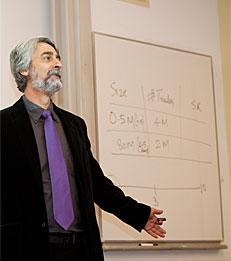Opinion
The Future of Artificial Intelligence
—


One fundamental and measurable difference between now and the past is that machine learning has helped us come a long way toward solving perception.
By Vasant Dhar
On January 11–12, NYU hosted a symposium titled “The Future of Artificial Intelligence,” which brought together artificial intelligence (AI) researchers from academia and industry for two intense days of discussion (http://cds.nyu.edu/ai/?pass=CfLjizw47). In this editorial, I provide some context and perspective on the event—specifically, the major questions facing the field at the current time and the technical and societal challenges involved in addressing them.
Google CEO Eric Schmidt gave the opening talk, listing the recent advancements in AI that have enabled capabilities for solving previously intractable problems. He stressed that AI should forge a future that benefits “the many” instead of “the few.” Challenges in water purification, synthetic food production, logistics of distribution, and optimal management of supply/demand of energy are some of the areas where our ability to leverage natural flows of data governs our ability to meet our collective needs.
Schmidt envisions a world where research is “open,” contrasted with military-supported research, which is often classified and motivated by considerations other than the good of humanity. He discussed the importance of industry/academic collaboration, for example, by measuring advances on open real-world data sets available to the scientific community at large. He stressed the need for “platforms” for scientific advancement and the need for systems built on these platforms to be able to handle the dynamic nature of problems, and be inventive enough to be able to learn in parallel with their operation.
Read the full article as published in Big Data.
___
Vasant Dhar is a Professor of Information Systems.
Google CEO Eric Schmidt gave the opening talk, listing the recent advancements in AI that have enabled capabilities for solving previously intractable problems. He stressed that AI should forge a future that benefits “the many” instead of “the few.” Challenges in water purification, synthetic food production, logistics of distribution, and optimal management of supply/demand of energy are some of the areas where our ability to leverage natural flows of data governs our ability to meet our collective needs.
Schmidt envisions a world where research is “open,” contrasted with military-supported research, which is often classified and motivated by considerations other than the good of humanity. He discussed the importance of industry/academic collaboration, for example, by measuring advances on open real-world data sets available to the scientific community at large. He stressed the need for “platforms” for scientific advancement and the need for systems built on these platforms to be able to handle the dynamic nature of problems, and be inventive enough to be able to learn in parallel with their operation.
Read the full article as published in Big Data.
___
Vasant Dhar is a Professor of Information Systems.
